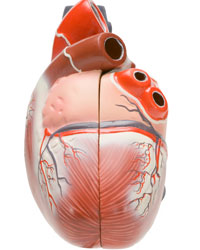 With Valentine’s Day on your mind, your heart might be fluttering at the thought of your beloved. Then again, that fluttering might signal something potentially more troublesome.
With Valentine’s Day on your mind, your heart might be fluttering at the thought of your beloved. Then again, that fluttering might signal something potentially more troublesome.
A flutter, a rapid heartbeat, the sensation that your heart is “skipping a beat”—these are all indications of arrhythmia, or irregular heartbeat. Other symptoms can include sensations of dizziness, shortness of breath, weakness or fatigue, chest discomfort, or even fainting.
Millions of people are affected by arrhythmias each year. They can be triggered by certain medications, caffeine, tobacco use, or stress. Frequently, however, there is no obvious cause.
People with a history of heart disease are at greater risk to develop arrhythmias. The incidence of arrhythmias tends to increase as we age, occurring most frequently in middle-aged adults. See the detailed discussion of arrhythmias in AOPA’s online Medical Certification department.
A retired pilot who shared his experience with AOPA discovered he had an arrhythmia while in the doctor’s office getting an electrocardiogram. The pilot, who requested anonymity, recalled that he had no significant symptoms, although he noticed that he was getting short of breath when he carried a bag up a flight of stairs. He attributed the breathlessness and occasional bouts of fatigue to being out of shape. The culprit was atrial fibrillation.
Atrial fibrillation is a form of arrhythmia that becomes increasingly common with advancing age. The Mayo Clinic estimates that more than 2 million Americans have atrial fibrillation, which can cause palpitations, shortness of breath, fatigue, and stroke. It’s not considered life-threatening, but if left untreated, atrial fibrillation brings an associated risk of blood clot formation that could lead to a stroke.
Does an arrhythmia diagnosis mean you have to say goodbye to your medical certificate? Not in all cases. The FAA issues medical certificates for many types of arrhythmias. If medication is part of the treatment, as is often the case, you’ll want to research the specific drug on AOPA’s database of FAA-accepted medications. Coumadin, for example, may be prescribed as an anticoagulant to prevent formation of blood clots. The database indicates Coumadin is accepted.
The retired pilot chose to undergo endoscopic surgery to correct the atrial fibrillation because he did not want to be on a regimen of blood thinners for the rest of his life. He was back in the air in about six months. He thought he had put the episode behind him.
In 2008, however, he experienced a recurrence and underwent a pulmonary vein ablation, in which a catheter inserted into the atrium is used to disrupt the pathway of the abnormal rhythm. During his recovery, he contacted AOPA to help him navigate the FAA paperwork requirements to maintain his medical status.
Giving up on his medical was never an option for the retired pilot, who enjoys flying his personal airplane and looks forward to many more years of aviation. He monitors his heart rate and pulse carefully. “You have to take care of yourself,” he says. “If health issues come up, you can’t push them aside.”
AOPA’s Pilot Information Center includes medical certification specialists who help members keep their medicals after a diagnosis of arrhythmia. Give us a call at 800/USA-AOPA weekdays from 8:30 a.m. to 6 p.m. about arrhythmias or any other cardiac or general medical-certification-related issues.



